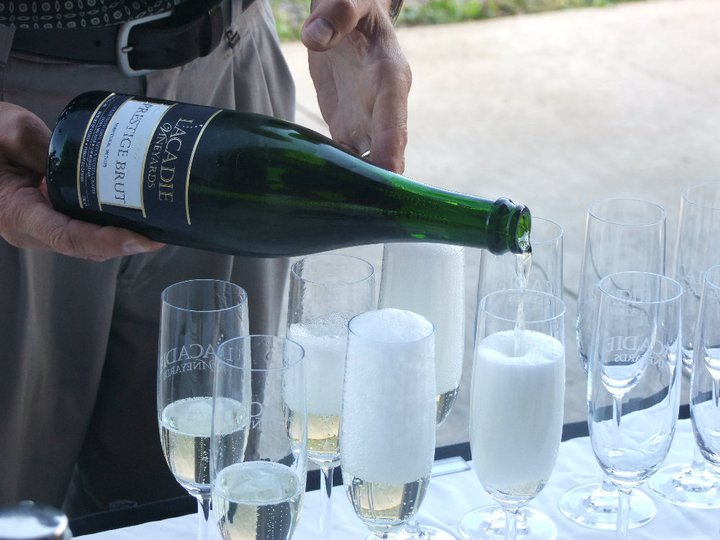L'Acadie Vineyards Blog
Welcome to the L'Acadie Vineyards blog and winery news
Buy Canadian, buy organic
Support your Local Economy
Did you know that when you purchase a bottle of our wine, made with 100% Nova Scotia grown grapes, you're contributing $76.73 to the local economy? Choosing 100% Nova Scotia wines not only supports our economy, but it strengthens and builds upon community growth and development.
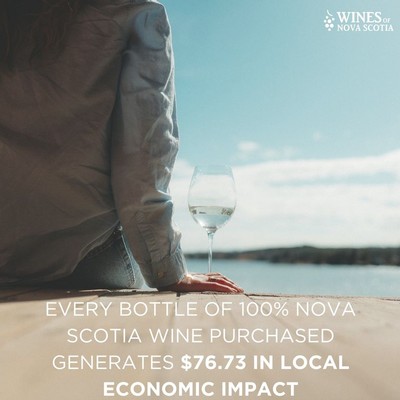
Image courtesy of Wines of Nova Scotia
When you purchase from us, you're also supporting the environment. Our certified Biocyclic Vegan and organic wines are made without harmful chemicals or animal byproducts to ensure that you can enjoy our signature Nova Scotia wines with 100% transparency.
Other Organic Canadian Producers
Here are a few of our family favourite Canadian organic farmers, companies, and stores:
- Medford Farms, Canning
- Cochrane Family Farms
- EOS, Wolfville
- Organic Earth Market, Halifax
- Luminate Market, Halifax
- Just Us Coffee, Wolfville
- TAN Coffee. Wolfville
- Made With Local, Nova Scotia
- Cove Kombucha, Nova Scotia
- Organic Matters, Vancouver
- Earth’s Own, Vancouver
- Elan
- La Milanaise
- Söta
- Healtea
- Nuts to You
- One Degree Organics
- Nature’s Path
- Natur Source
- Gaia Organic Seeds
- Camino
- Cha’s Organics
- Sprague Soup
- Nuts For Cheese
- Skin Essence Organics
- Carina Organics
Grower sparkling wine - our model
Our provincial liquor store has many sparkling wine options from large companies such as from Champagne but rarely will you find a Grower Champagne – small scale producers preserving family farming traditions and growing the grapes that go into the bottle. Our grower sparkling winery in Gaspereau, Nova Scotia parallels these interesting French wines.
Large sparkling wine brands such as Veuve Clicquot, Moet and Mumm buy most of their grapes from contracted growers for large scale bottle production shipped around the world. This disconnect is the main difference with grower sparkling wines.
Terroir
You create a sense of place, or terroir, in a wine when you focus on a single vineyard. For example, grapes for our Prestige Brut Estate are always sourced from the same vineyard block with 20 cm topsoil over an ancient seabed- a unique composition of slate, schist and sandstone gravels. These wines have minerality and slight saline characters that international wine judges have identified and awarded. Grape growing is thus extremely important since grapes that we nurture are transparently showcased for judge and consumer approval.
Sustainability
We farm organically – we understand the quality stakes and we want to preserve our land for family succession. Our organic vineyard has been organic since inception 20 years ago and in 2021 we achieved another level of sustainability - certified Biocyclic Vegan, soil to glass. We grow grapes with cover crops for regenerative agriculture and living soils, plant-based teas and no animal manures, and encourage biodiversity. Organic wines express their terroir better than chemical dependent vineyards.
Recently disgorged
Disgorging is the last process of sparkling wine production to remove yeast from the bottle, add dosage (sweetened wine), insert the cork and wire cage, and get ready to release the new vintage. Bottles usually rest on cork for about a month to marry flavours with dosage before release. Large sparkling wineries distribute their bottles around the world and they sit on cork for several years developing a richer honeyed character. Smaller wineries have the ability to sell bottles direct with less time on cork. These recently disgorged bottles are sought after for their freshness.
Vintage Dated
Large sparkling wineries are well branded and marketed with elevated prices. People buy them for brand recognition. There is a consistent flavour profile by blending reserve wines that are held back from past years. These non-vintage wines differ from vintage-dated grower sparkling wines where the growing season is showcased, and celebrated. Much like how a single vineyard gives a sense of place with unique terroir, vintage dates reflect what Mother Nature offered during that growing season. Winemaking has to be in top form to harness these gifts by deciding on variables such as harvest dates, fermentation temperature, lees contact time and dosage levels added at disgorging for balance.
Matching style, variety and soil
20 years of style, variety and soil
This year marks 20 years since we drove across Canada from an established winemaking career in the Okanagan Valley, British Columbia to acquire our piece of paradise in Gaspereau, Nova Scotia. Fallow farm land ready for us to plant the province’s first organic vineyard, and our decisions on wine style and variety are standing the test of time.
Time honoured traditions of old world wine regions dictate suitable varieties and wine styles for individual appellations and sub appellations, usually evolving from trial and error of matching them to intrinsically unique soils and microclimates. We made an informed decision, some might call it bold, in 2004 by drawing upon years of sparkling winemaking experience in the Okanagan Valley that the 30 acres in Gaspereau would produce world class sparkling wine. Our palette: uniquely well-drained ancient seabed gravels covered with 15-30 cm loamy top soil tilted 5% towards north west. The industry mantra at that time was “south slope” but I had been making wine from different slopes for years – south for hot-loving reds, north and east for whites, and quite often struggled with grapes planned for sparkling wine production that were ripening too fast, losing fruitiness and freshness. The slope direction seemed like a good fit and it was the soil, schist, sandstone and slate that sealed the idea of suitability for sparkling wine. Wine flavours are influenced by climate and grape variety, and soil comes in a close third. We anticipated minerality nuances, a proven wine characteristic in great wines of the world, and international judges are noticing.
Decanter World Wine Awards 2018, London, England – 92 points, Silver Medal for 2013 Prestige Brut Estate
Judges’ notes, "A floral, apple nose with chalky lemon and creamy pear on the refreshing, mineral palate."
There was risk that the soil would not retain enough moisture compared to the typical rich clay-loam soils around us but even though the young vines struggled during establishment they grew deep roots for resilience to future climate extremes like drought. That coupled with our living soils encouraged with organic farming practice bodes well for climate change resilience. Roots are supported by colonies of fungus living symbiotically, helping water, nutrient....and flavour uptake.
Read more about Climate change resilience and organic farming
On our many visits to Nova Scotia to visit family before we moved back, we got to know the region’s signature grape variety, L’Acadie Blanc, and we’d talk long into the night about whether and how we could make it into a world-class sparkling wine. There wasn’t a bubble in the province at that time but we saw the potential – freshness, apple, citrus, moderate alcohol. Our second bold decision was initially planting 8 acres of exclusively L’Acadie Blanc for sparkling wine at a time when most of the region was planting multiple varieties for blending versatility and more selection of varietal wines. We foresaw traditional method sparkling wine to be the defining style for our region, in particular, L’Acadie Blanc cuvees.
There have been many milestones in the last 20 years that have proven our decisions,
- 2005 – established Nova Scotia’s first organic vineyard
- 2008 – opened sustainable winery with geothermal heating and cooling and insulated concrete construction
- 2008 – released Nova Scotia’s first traditional method sparkling
- 2008 – Nova Scotia’s first appassimento wines. First releases of Alchemy and Passito from our 5-year appassimento research project with Agriculture Canada and collaboration with Italian researchers.
- 2010 – gold and top scoring sparkling for 2007 Prestige Brut at 2010 National Wine Awards. A first for Nova Scotia.
- 2011 – silver medal for 2007 Prestige Brut at 2011 Effervescents du Monde (Dijon, France) First international sparkling award for Nova Scotia.
- 2015 – silver medal for 2010 Prestige Brut zero dosage at 2015 Effervescents du Monde.
- 2021 - Certified to European Biocyclic Vegan standard, the first farm and winery in North America. Read more about our vegan wines, Why we are Biocyclic Vegan
- 2023 – gold medal, 95 points for 2017 Prestige Brut Estate at 2023 Decanter World Wine Awards. First gold medal for Nova Scotia from Decanter, after earning many silver awards and 92-point designations for previous vintages.
The Biocyclic idea
The Biocyclic Idea
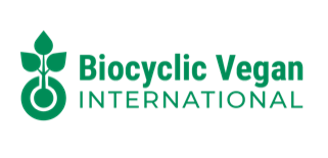
This excerpt from the international Biocyclic Vegan Standard really puts colour and teeth into our ethos - "protect environment, animals, people for healthy cycles of life."
Excerpt from the Biocyclic Vegan Standard:
1 The Biocyclic Idea
1.1 The meaning of the term "biocyclic"
"The form of agriculture that is prevailing today is characterized by a production method which is based on an unclosed system where man uses the resources of nature without providing any compensation in exchange that would guarantee him a durable and unlimited availability of these resources also in the future. In opposition to this non-sustainable approach stands the biocyclic idea the aim of which is the conservation or the rehabilitation of healthy cycles of life (Greek: “bios” = life + “kyklos” = cycle, circle) in a global sense, which means in all areas of the human existence. This concerns the relationship of the human being to his entire natural and connatural world – to humans, animals and also plants – and it requires a responsible interaction with the environment that he uses and influences. All personal and economic activity should thus take place in a holistic context with the goal to make a conscious and sustainable contribution to a development fit for the future also in the area of the agriculture and food industry.
In order to produce natural products issuing from healthy circles, an approach is needed, that starting from a healthy soil and passing by a healthy plant will lead to a healthy human being. Only in such a way the biocyclic “circle of the living substance” (Dr. med. habil. Hans-Peter Rusch) can be seamlessly influenced and enhanced in a sustainable manner and in harmony with the laws of nature. Only an activity that puts a strong emphasis on the cyclic concept will at the same time yield a multiple benefit in different areas such as health, environment, global food supply and animal ethics.
For this reason it is desirable that the biocyclic idea of the integration of human behaviour into vital circles that are in harmony with the laws of nature becomes a fundamental pillar for the activity of each organically working farmer. In this respect the production and supply of nutritious and tasty food issuing from healthy and, if possible, closed circuits, is an essential element. Furthermore, it will be useful if a partnership between producers and consumers comes into place, in the sense of a food production that complies with the social, ethical and global responsibility towards fellow human beings, animals and the environment. "
Read more of the standard,
https://www.biocyclic-vegan.org/partners/the-biocyclic-vegan-standard/
2024 Harvest Summary
2024 Harvest Summary via Instagram
A harvest update from winemaker Bruce Ewert for our Gaspereau vineyard in Nova Scotia, Canada. Our estate winery near Wolfville makes certified Biocyclic Vegan and organic sparkling wines and this year we harvested Sauvignon Blanc for a Sancerre-style wine to be released in 2025.
2024 Harvest Update
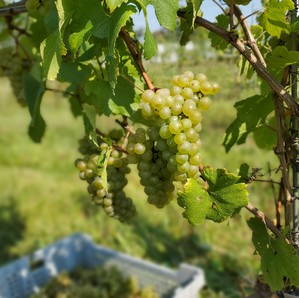
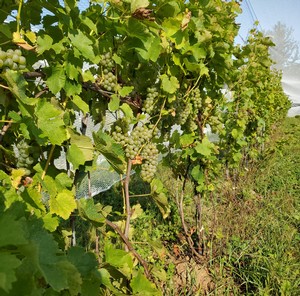
Chardonnay and Sauvignon Blanc 2024 at L'Acadie Vineyards, Gaspereau, NS
Harvest 2024 is halfway done and quality and freshness are head turning! We started picking September 16, our earliest harvest ever, and it reminds me of 1998 in the Okanagan Valley when I was winemaker at See Ya Later Ranch winery. That was the earliest harvest for British Columbia wineries at that time too and marked beginning signs of climate change. Here at L'Acadie Vineyards near Wolfville we watch acidity (freshness) closely by sampling grape maturity leading up to harvesting vineyard blocks and have always maintained freshness for close to twenty vintages, the benefit of having our Nova Scotia winery in such an ideal cool climate for sparkling wine.
2024 marks a rebound year from the 2023 polar vortex in Nova Scotia. Pictured above is organic & Biocyclic Vegan Chardonnay and Sauvignon Blanc planted in 2019. These varieties are far more sensitive than other varieties that we grow at our Gaspereau vineyard, so harsh winter weather can have devastating effects. Last year and this year we meticulously trained new trunks and interplanted where vines had died. We are so excited and grateful to have a beautiful small-lot harvest from our estate Chardonnay, Sauvignon Blanc and Pinot Noir this year. 🍇✨
Growing grapes on the limits of cool climate viticulture can have risks such as winter damage, but rewards in quality can often surpass world wine standards. Fingers crossed this will be another award winning vintage!
Related blogs,
/blog/Vineyard-Update---Polar-Vortex-Impact
/blog/Update-from-the-Vineyard
~~~~~~~
Thanks for supporting farm wineries in Nova Scotia! These are challenging times with government and we appreciate your support. https://www.cbc.ca/news/canada/nova-scotia/wine-grape-growers-tim-houston-vineyards-1.7333355
Wanted: A killer for Japanese Beetle
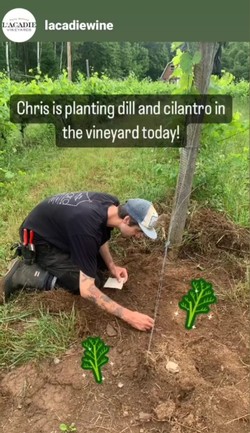
There’s a potentially significant new vineyard pest that is starting to make its home in Nova Scotia vineyards called Japanese Beetle. We haven’t seen any at L’Acadie Vineyards but it’s at our backdoor and researchers like Dr. Deb Moreau at the Kentville Research Centre have been monitoring migration, defoliating feeding habits and predators for 10 years. She has given updates and told my classes on guest talks that 90% of insects die in typical Nova Scotia winters and warming could bring more pests – a double-edged sword for this year’s great growing season.
Wanted: A killer
This year we started planting plots of dill and cilantro to attract predators for phylloxera that we have been monitoring in our Leon Millot block, a practice of Biocyclic Vegan and organic pest control. Coincidently, those herbs also attract a predator for Japanese Beetle called Winesome fly (good name for a wine hero) and we plan to expand these plots to include sweet alyssum next year. Added to that, our forest edges next to vineyard blocks hopefully will provide another biodiversity backstop against the new pest.
Read more, https://www.cbc.ca/news/canada/nova-scotia/japanese-beetles-crops-nova-scotia-1.7303549
Update from the Vineyard - late summer
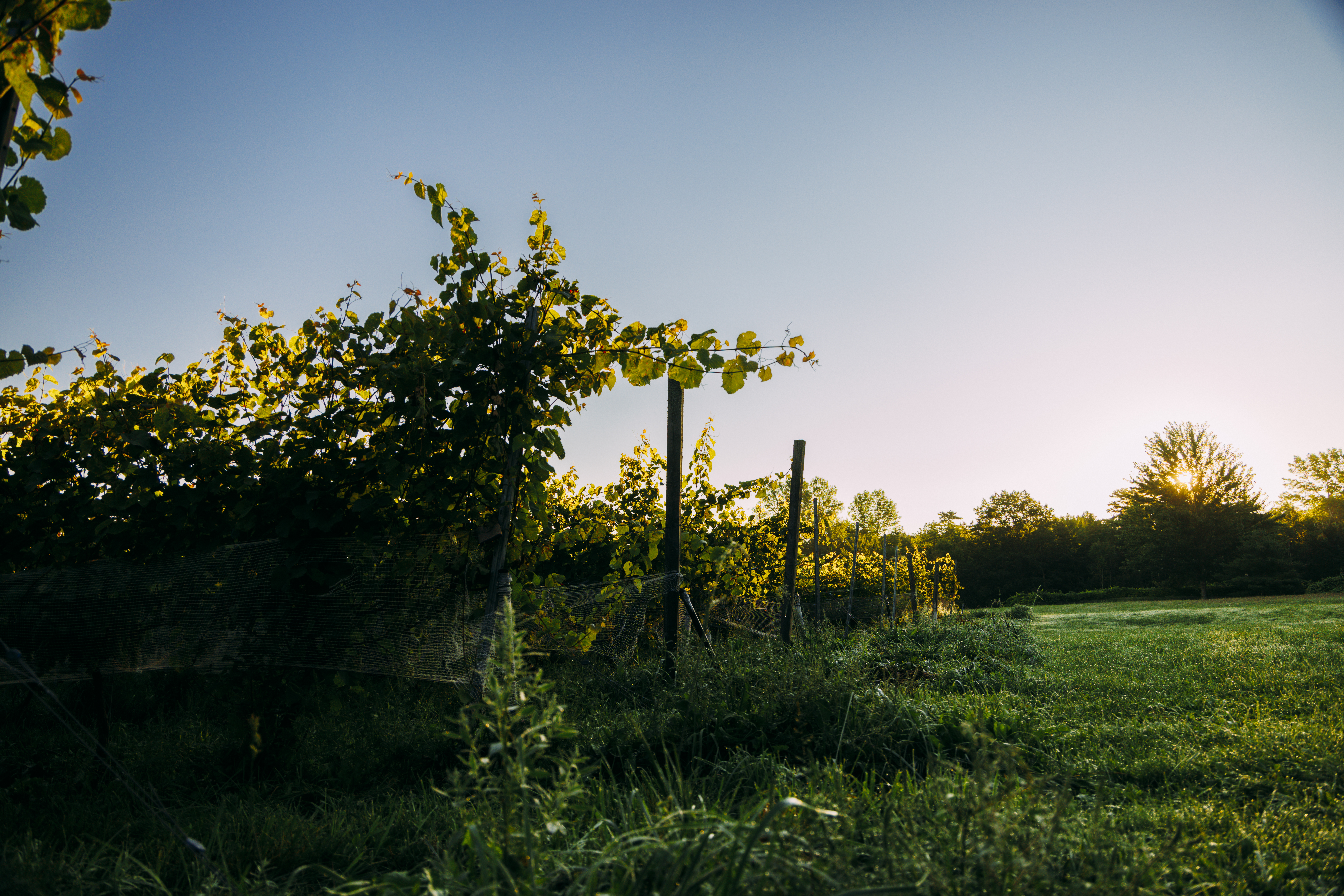
Celebrating 20 years since moving back to Nova Scotia this year, and next year 20 years since planting for sparkling on our rocky soil. This harvest will be extra special as we slide into late summer putting up nets and final tweaking crop levels. It has been a great growing season except for high mildew pressures with rains and humidity but our organic practices have controlled it and our well-drained soil handled those +100mm rain events. Even planning on over-the-row netting for Sauvignon Blanc and Pinot Noir this year! (wine club members will be excited for more small lots)
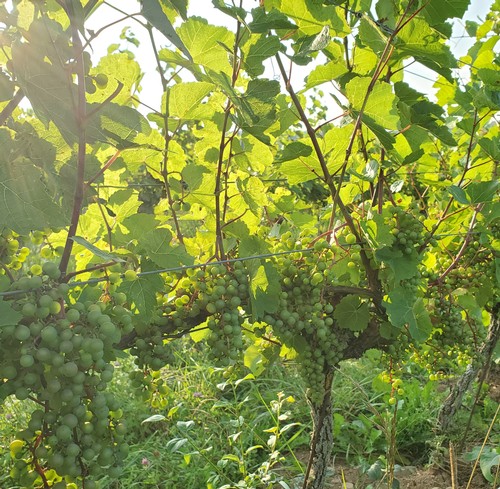
Read blog about why we chose our rocky vineyard 20 years ago, Discovering Rocks
We planted more Seyval Blanc this year mainly for Tidal Bay and interplanted Pinot Noir, Sauvignon Blanc and some Chardonnay to replace vines from the polar vortex last year. Wine club members have been enjoying 2021 sparklings from first harvests of these blocks. Vineyard supervisor Chris planted cilantro and dill at end posts to attract phylloxera predators and we hope to try sweet alyssum next year recommended by our friends at Biocyclic Vegan.
Beautiful time to visit our winery near Wolfville. Book a guided tasting
Sante,
Bruce
Effervescents du Monde - Nova Scotia's first international sparkling awards
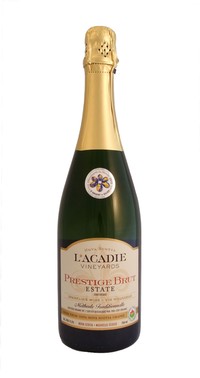
Effervescents du Monde is a prestigious competition of the best sparkling wines in the world and in 2011 and again in 2015 L'Acadie Vineyards turned heads by claiming silver medals for their Prestige Brut and the first international sparkling awards for Nova Scotia!
The 2007 and 2010 vintages of Prestige Brut that won at the competitions were superb and put Nova Scotia wine region on the sparkling wine map. Since then there have been continuous accolades and more awards for more recent vintages, namely multiple times at Decanter World Wine Awards in London where the 2017 Prestige Brut Estate won Gold and 95 points, the first Decanter gold medal for Nova Scotia, the highest level of quality achievement.
The matrix of factors and decisions was deliberate to achieve this highest level of quality,
- Bruce Ewert earned similar wine awards when he was an experienced sparkling winemaker in the Okanagan Valley.
- Bruce and family indentified that L'Acadie Blanc was ideal for sparkling while on investigative trips to Nova Scotia and tasting still wine versions from Annapolis Valley wineries in the early 2000's before there was a bubble in the province. We were the first to release sparkling wine in 2008!
- L'Acadie Vineyards estate in Gaspereau was chosen for its rocky well-drained soil. Schist, sandstone, slate, and ancient seabed. In 2017 test holes revealed roots going deep, over 3 feet.
- Farming organically and now Biocyclic Vegan as well encourages a heathly living soil so terroir mineral characters are amplified
- Prestige Brut comes from the same estate block every year, traditional method sparkling with aging for 5 years in a underground tirage cellar.
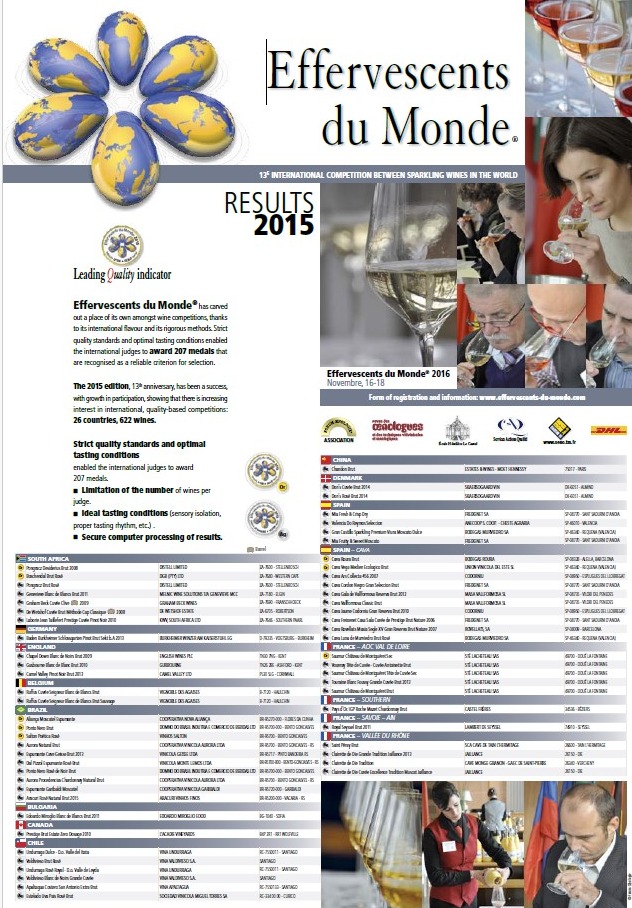
20 Years - Milestones along our journey
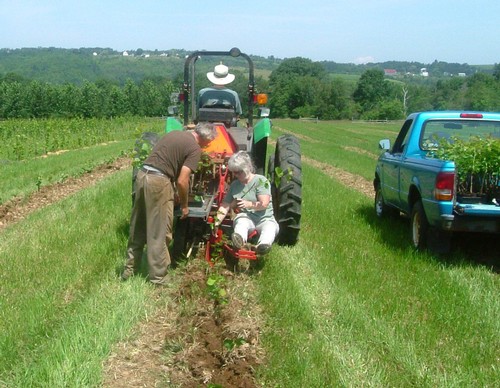
This year, this month, marks 20 years since we drove across Canada from an established winemaking career in the Okanagan Valley to acquire our piece of paradise in Gaspereau, Nova Scotia. Each year on July 21 our family celebrates that coming-home milestone and next year our winery will be celebrating the formal establishment of L’Acadie Vineyards – 20 year anniversary of planting organic vines for sparkling wine in 2005.
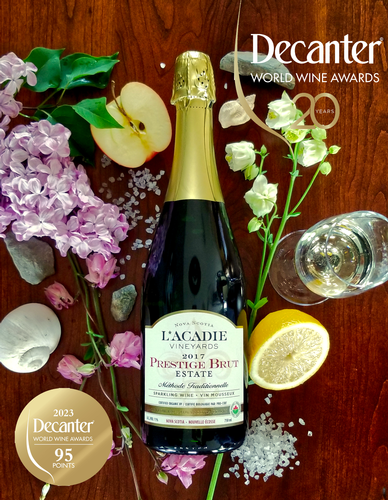
Many milestones in the last 20 years, here are the highlights,
- 2005 – Established Nova Scotia’s first organic vineyard. Certified organic from inception.
- 2008 – Opened sustainable winery with geothermal heating and cooling and insulated concrete construction
- 2008 – Released Nova Scotia’s first traditional method sparkling
- 2008 – Nova Scotia’s first appassimento wines with releases of Alchemy and Passito from our 5-year appassimento research project with Agriculture Canada and collaboration with Italian researchers.
- 2010 – Gold and top scoring sparkling for 2007 Prestige Brut at 2010 National Wine Awards. A first for Nova Scotia.
- 2011 – Silver medal for 2007 Prestige Brut at 2011 Effervescents du Monde (Dijon, France) First international sparkling award for Nova Scotia.
- 2015 – Silver medal for 2010 Prestige Brut zero dosage at 2015 Effervescents du Monde.
- 2021 - Certified to European Biocyclic Vegan standard, the first farm and winery in North America.
- 2023 – Gold medal, 95 points for 2017 Prestige Brut Estate at 2023 Decanter World Wine Awards. First gold medal and highest level of achievement for Nova Scotia sparkling from Decanter, after earning silver and 92 points for multiple previous vintages.
